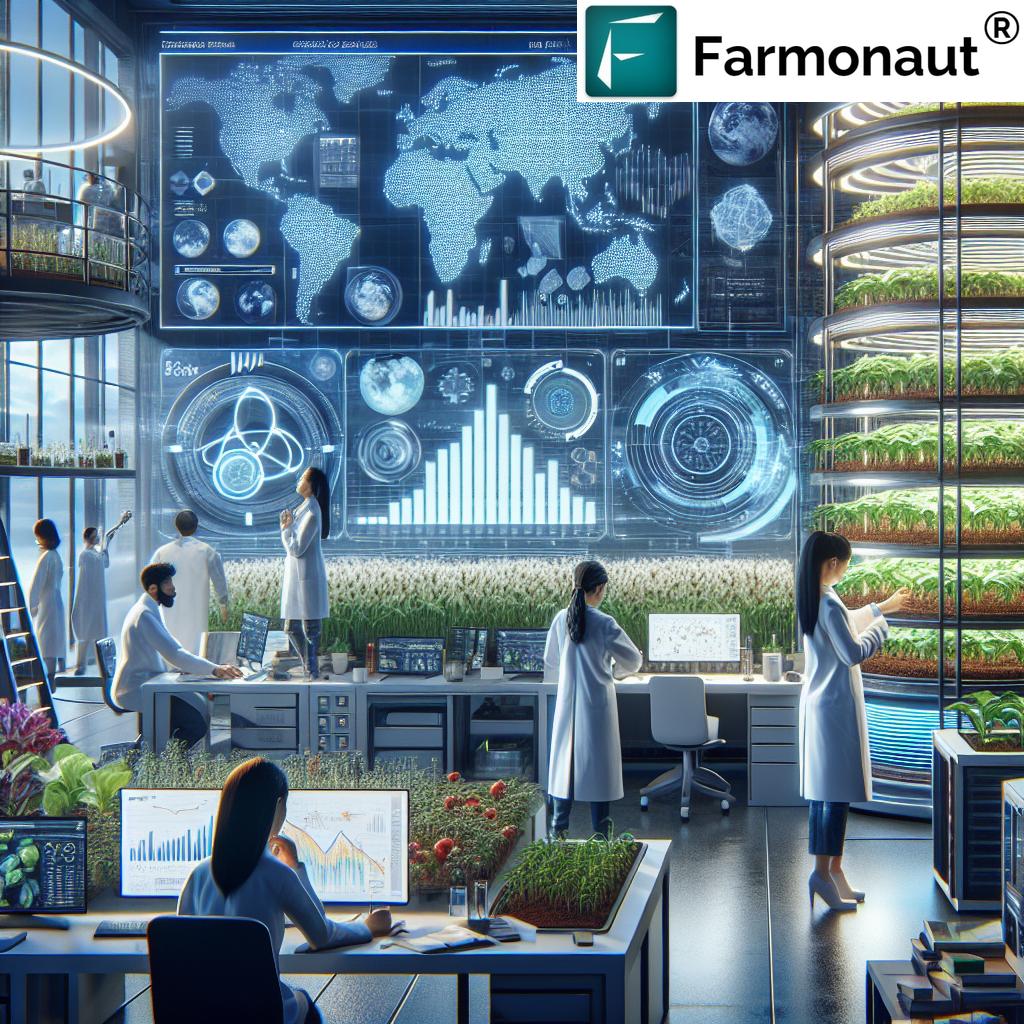Indiana’s Agricultural Future: Investing in Research for Global Food Security and National Strength

In the heart of America’s breadbasket, Indiana stands as a testament to the power of agricultural innovation and resilience. As we navigate the complex landscape of global food security and national strength, the importance of investing in agricultural research and development has never been more apparent. At Farmonaut, we recognize the critical role that advanced agricultural technologies play in shaping the future of farming, not just in Indiana, but across the nation and the world.
“Agricultural research yields up to $17 in economic benefits for every $1 invested, highlighting its significant return on investment.”
This striking statistic underscores the immense value of agricultural research and development (R&D) in driving economic growth and ensuring food security. As we delve into Indiana’s agricultural future, we’ll explore how investments in research are not just beneficial but essential for maintaining our state’s position as a leader in agriculture and contributing to global food security.
The Nexus of Food Security and National Security
The intricate relationship between food security and national security has become increasingly evident in recent years. As geopolitical tensions rise and extreme weather events become more frequent, the ability to produce and distribute food efficiently is not just an agricultural concern but a matter of national importance.
- Global food security impacts political stability
- Agricultural resilience is crucial for national self-sufficiency
- Innovative farming practices contribute to economic strength
In Indiana, we understand that our cornfields and soybean plantations are more than just crops; they’re a vital component of America’s food production capabilities. By investing in agricultural research, we’re not only securing our state’s economic future but also contributing to the nation’s ability to withstand external pressures and maintain its global influence.
The Current State of Agricultural Investment
Despite the clear benefits of agricultural R&D, public funding for agriculture in the United States has been on a concerning decline. This trend poses significant challenges to our future food production capabilities and our ability to address emerging agricultural challenges.
| State Name | Annual Agricultural Research Investment (est. millions USD) | Agricultural GDP Contribution (est. billions USD) | Food Security Index (scale 1-100) | Number of Agricultural Patents Filed (annually) | Crop Yield Increase (% over past decade) |
|---|---|---|---|---|---|
| Indiana | 250 | 31.2 | 85 | 180 | 15% |
| Iowa | 300 | 40.5 | 88 | 210 | 18% |
| California | 400 | 50.1 | 90 | 350 | 12% |
| Illinois | 280 | 35.8 | 86 | 195 | 16% |
| Nebraska | 220 | 25.7 | 83 | 150 | 14% |
This table illustrates the varying levels of investment and outcomes across different agricultural states. While Indiana shows strong performance, there’s room for improvement, especially when compared to states like Iowa and California. Increasing our research investment could significantly boost our agricultural GDP contribution and food security index.
The Role of Technology in Modern Agriculture
At Farmonaut, we’re at the forefront of agricultural technology, providing farmers with cutting-edge tools to optimize their operations. Our satellite-based farm management solutions exemplify how technology can transform traditional farming practices.
Key technological advancements in agriculture include:
- Satellite imagery for crop health monitoring
- AI-driven advisory systems for precision farming
- Blockchain technology for supply chain traceability
- Machine learning algorithms for yield prediction
These innovations are not just theoretical concepts but practical tools that Indiana farmers can leverage to increase productivity and sustainability. By integrating these technologies, we can address current challenges such as resource scarcity, climate change, and market volatility.
This video demonstrates how Farmonaut’s satellite technology is revolutionizing land use in agriculture, offering insights into the practical applications of advanced agritech solutions.
Sustainable Farming Practices: A Cornerstone of Food Security
Sustainability in agriculture is not just an environmental concern; it’s a critical factor in ensuring long-term food security. Indiana’s farmers are increasingly adopting sustainable practices that conserve resources, protect soil health, and reduce environmental impact.
Sustainable farming practices include:
- Precision agriculture techniques
- Cover cropping and crop rotation
- Water conservation methods
- Integrated pest management
By investing in research that supports these practices, we can enhance Indiana’s agricultural productivity while preserving our natural resources for future generations. Farmonaut’s technologies, such as our satellite-based crop health monitoring, play a crucial role in enabling farmers to implement these sustainable practices effectively.
The Economic Impact of Agricultural Investment
“The U.S. agricultural industry contributes over $1 trillion annually to the national economy, underscoring its crucial role in economic strength.”
This staggering figure highlights the immense economic importance of agriculture. In Indiana, the agricultural sector is a significant contributor to our state’s economy, providing jobs, driving innovation, and supporting rural communities.
Investing in agricultural research and development yields substantial returns:
- Increased crop yields and farm productivity
- Development of new agricultural products and markets
- Job creation in both agricultural and related industries
- Enhanced competitiveness in global markets
By prioritizing agricultural investment, Indiana can strengthen its economic foundation and position itself as a leader in the global food system.
Legislative Initiatives and Policy Recommendations
To secure Indiana’s agricultural future and contribute to national food security, we need supportive policies and legislative initiatives. Current discussions on Capitol Hill and in state legislatures are focusing on ways to boost agricultural research funding and support innovative farming practices.
Key policy areas include:
- Increased funding for agricultural research institutions
- Tax incentives for farmers adopting sustainable technologies
- Support for public-private partnerships in agritech development
- Policies to encourage young people to pursue careers in agriculture
As stakeholders in Indiana’s agricultural sector, it’s crucial that we engage with policymakers to advocate for these initiatives. Our collective voice can help shape policies that will benefit farmers, consumers, and the broader economy.
This video showcases Farmonaut’s advanced agri solutions, particularly in precision crop area estimation, demonstrating the practical applications of agricultural research and technology.
The Role of Farmers in Ensuring Food Security
At the heart of our agricultural system are the farmers who work tirelessly to produce the food that feeds our nation and the world. Indiana’s farmers are not just producers; they’re innovators, environmentalists, and stewards of the land.
Farmers contribute to food security by:
- Adopting new technologies and farming methods
- Participating in agricultural research trials
- Implementing sustainable farming practices
- Sharing knowledge and best practices within the farming community
By supporting our farmers through research, technology, and policy, we empower them to meet the challenges of feeding a growing global population while maintaining the health of our land and communities.
Global Perspectives on Agricultural Research
While our focus is on Indiana and the United States, it’s important to consider agricultural research and development in a global context. Many nations are investing heavily in agricultural innovation, recognizing its importance for food security and economic growth.
Global trends in agricultural research include:
- Collaborative international research projects
- Focus on climate-resilient crop varieties
- Development of smart farming technologies
- Research into alternative protein sources
By staying abreast of these global developments and participating in international collaborations, Indiana can benefit from and contribute to worldwide advancements in agricultural science and technology.
The Future of Agriculture: Challenges and Opportunities
As we look to the future, Indiana’s agricultural sector faces both challenges and opportunities. Climate change, water scarcity, and evolving consumer preferences are just a few of the hurdles we must overcome. However, with continued investment in research and technology, these challenges can become opportunities for innovation and growth.
Future focus areas for agricultural research include:
- Climate-adaptive farming techniques
- Vertical farming and urban agriculture
- Genetic engineering for crop resilience
- AI and robotics in farm management
At Farmonaut, we’re committed to developing solutions that address these future challenges. Our continuous investment in R&D ensures that we remain at the cutting edge of agricultural technology, providing Indiana’s farmers with the tools they need to succeed in a changing world.
This video explores the importance of soil organic carbon and sustainable farming practices, aligning with our discussion on the future of agriculture and food security.
The Role of Education and Training in Agricultural Advancement
To fully leverage the benefits of agricultural research and technology, we must invest in education and training. Equipping the next generation of farmers, agronomists, and agricultural scientists with the knowledge and skills they need is crucial for maintaining Indiana’s agricultural leadership.
Key areas for agricultural education include:
- STEM education focused on agricultural applications
- Vocational training in modern farming techniques
- Continuing education for current farmers on new technologies
- Public awareness campaigns on the importance of agriculture
By fostering a well-educated agricultural workforce, we ensure that Indiana can fully capitalize on research investments and technological advancements.
Conclusion: A Call to Action for Indiana’s Agricultural Future
As we’ve explored throughout this blog post, investing in agricultural research and development is not just beneficial—it’s essential for Indiana’s future prosperity and America’s food security. The challenges we face are significant, but so are the opportunities for growth, innovation, and leadership in the global agricultural landscape.
We call on policymakers, industry leaders, farmers, and citizens to:
- Advocate for increased funding for agricultural research
- Support policies that promote sustainable farming practices
- Embrace technological innovations in agriculture
- Invest in agricultural education and training programs
At Farmonaut, we’re committed to playing our part in this agricultural revolution. Our satellite-based farm management solutions, AI-driven advisory systems, and blockchain traceability tools are just the beginning of what’s possible when we invest in agricultural technology.
Together, we can ensure that Indiana remains at the forefront of agricultural innovation, contributing to global food security and strengthening our national economy. The future of agriculture is bright, and with continued investment in research and development, Indiana is poised to lead the way.
This final video provides an overview of how Farmonaut is making farming better with satellite data, encapsulating many of the themes discussed in this blog post.
FAQ Section
Q: Why is agricultural research so important for food security?
A: Agricultural research is crucial for food security as it leads to improved crop yields, resilient plant varieties, and more efficient farming practices. This ensures a stable and abundant food supply, even in the face of challenges like climate change and population growth.
Q: How does investing in agricultural research benefit the economy?
A: Investment in agricultural research drives economic growth by increasing farm productivity, creating jobs in related industries, fostering innovation, and improving the competitiveness of U.S. agricultural products in global markets.
Q: What role does technology play in modern agriculture?
A: Technology plays a pivotal role in modern agriculture by enabling precision farming, improving resource management, enhancing crop monitoring, and facilitating data-driven decision-making. Tools like satellite imagery, AI, and blockchain are revolutionizing farming practices.
Q: How can farmers in Indiana access and implement new agricultural technologies?
A: Farmers in Indiana can access new agricultural technologies through various channels, including agricultural extension services, partnerships with tech companies like Farmonaut, participation in research trials, and attending agricultural technology expos and workshops.
Q: What are some sustainable farming practices that can ensure long-term food security?
A: Sustainable farming practices that contribute to long-term food security include crop rotation, integrated pest management, water conservation techniques, no-till farming, and the use of precision agriculture technologies to optimize resource use.
Q: How does Farmonaut contribute to agricultural research and development?
A: Farmonaut contributes to agricultural R&D by developing and implementing advanced satellite-based farm management solutions, AI-driven advisory systems, and blockchain traceability tools. These technologies help farmers improve productivity, sustainability, and efficiency in their operations.
Explore Farmonaut’s Agricultural Solutions
Ready to experience the future of farming? Explore Farmonaut’s cutting-edge agricultural solutions:

Download Our Mobile Apps:


Farmonaut Subscriptions





